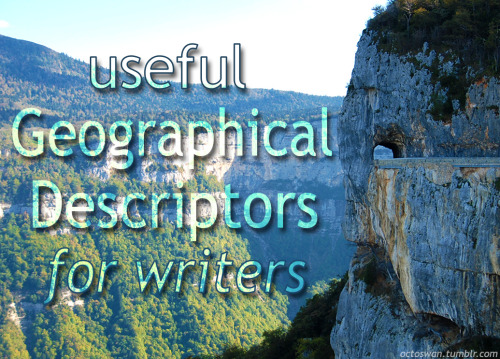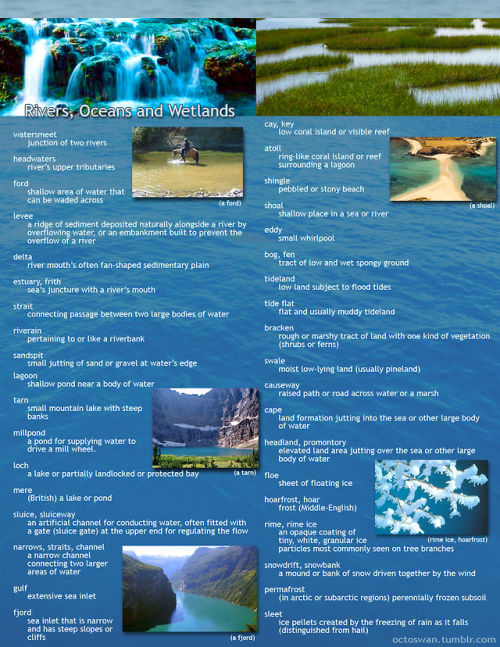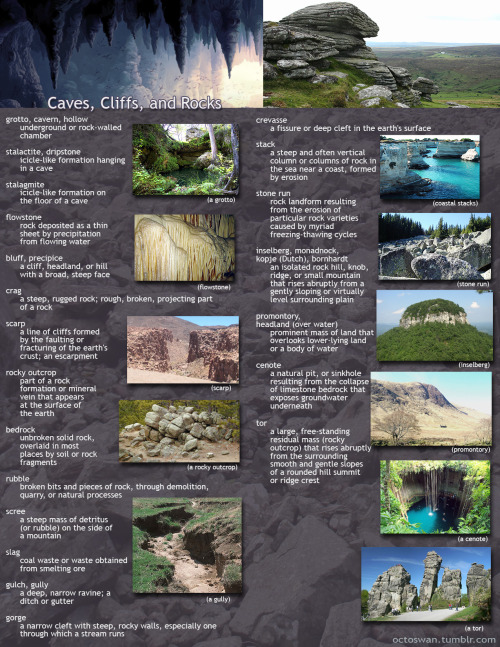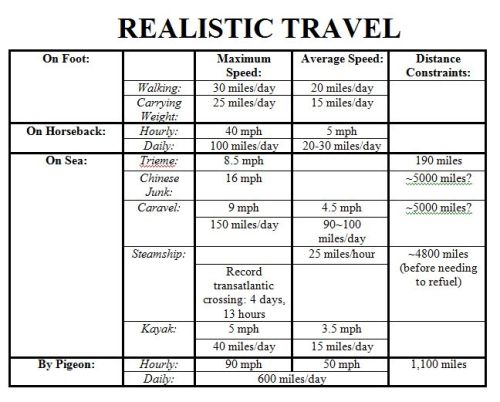How To Show Emotions
How to show emotions
Part VI
How to show insecurity
not holding/breaking eye contact
fidgeting
crossing their arms
trying to cover up their body
making themself seem smaller
playing with their hands
hiding their hands in their pockets
holding their head down
blushing
clearing their throat
biting their nails
biting their lips
nervous laughter
stuttering
How to show being offended
stiffening up
hard line around the lips
frozen stare
narrowing of the eyes
turning their head to the side
quickening heartbeat
turning red
making themself bigger, ready to fight
How to show compassion
gentle and soft smile
relaxed facial features
softening of their eyes
openly showing how they feel
leaning towards the other one
nodding along, not directly interjecting, but encouraging
deep breaths inbetween
gentle touches to comfort
How to show being pleased
big smile/grinning
laying head slightly to the side
moving one shoulder up
pursing their lips while smiling
very open body language
leaning back
Part I + Part II + Part III + Part IV + Part V
If you like my blog and want to support me, you can buy me a coffee or become a member! And check out my Instagram! 🥰
More Posts from Writersreferencez and Others
A list of phobias that your OC (original character) can have
Arachnophobia: Fear of spiders.
Acrophobia: Fear of heights.
Claustrophobia: Fear of confined or crowded spaces.
Ophidiophobia: Fear of snakes.
Cynophobia: Fear of dogs.
Trypophobia: Fear of clusters of small holes or bumps.
Social Anxiety Disorder (SAD): Fear of social situations and interactions.
Glossophobia: Fear of public speaking.
Hemophobia: Fear of blood.
Nyctophobia: Fear of darkness or night.
Thanatophobia: Fear of death or dying.
Mysophobia: Fear of germs or dirt.
Entomophobia: Fear of insects.
Aquaphobia: Fear of water.
Astraphobia: Fear of thunder and lightning.
Dentophobia: Fear of dentists or dental procedures.
Selenophobia: Fear of the moon.
Taphophobia: Fear of being buried alive or of cemeteries.
Xenophobia: Fear of strangers or foreigners.
Atychiphobia: Fear of failure or not being good enough.
Consider which phobia fits well with your OC's personality, background, and the story you want to tell. You can also explore how their phobia influences their behavior, relationships, and journey throughout the novel.
Showing 'Anticipation' in Writing
Fingers tapping rhythmically on a surface.
Shifting weight from one foot to the other.
Checking the time frequently.
Eyes darting to the door or window expectantly.
Taking deep, excited breaths.
Biting the lower lip in nervous excitement.
Rubbing hands together eagerly.
Whispering, “I can’t wait” to themselves or others.
Fidgeting with objects, like twisting a ring or playing with a pen.
Heart pounding with eagerness.
Perking up at any noise that might signal the anticipated event.
Smiling slightly, as if imagining the future moment.
Knees bouncing up and down while seated.
Glancing at their phone or watch repeatedly.
Clutching a piece of clothing or accessory tightly.
Standing on tiptoe to get a better view.
Ears straining to catch any sound.
Swallowing nervously, throat dry with excitement.
Humming or softly singing to pass the time.
Practicing a speech or action they are looking forward to.
Writing Description Notes:
Updated 9th September 2024 More writing tips, review tips & writing description notes
Facial Expressions
Masking Emotions
Smiles/Smirks/Grins
Eye Contact/Eye Movements
Blushing
Voice/Tone
Body Language/Idle Movement
Thoughts/Thinking/Focusing/Distracted
Silence
Memories
Happy/Content/Comforted
Love/Romance
Sadness/Crying/Hurt
Confidence/Determination/Hopeful
Surprised/Shocked
Guilt/Regret
Disgusted/Jealous
Uncertain/Doubtful/Worried
Anger/Rage
Laughter
Confused
Speechless/Tongue Tied
Fear/Terrified
Mental Pain
Physical Pain
Tired/Drowsy/Exhausted
Eating
Drinking
Warm/Hot
diferent ways to describe the fear of something?
Different Ways to Describe Fear
Symptoms of Fear:
accelerated breathing
accelerated heart rate
goosebumps
sweating
sleep disturbance
butterflies in stomach
dizziness
Body Language Responses to Fear:
hunching shoulders
shrinking away
wide eyes
shaking / trembling
freezing
wrapping arms around themselves
shaking hands
Writing Prompts:
-> feel free to edit and adjust pronouns as you see fit.
She pressed a trembling hand to her chest as if that would do anything to slow her racing heart.
His eyes were crazed, darting around to look at the shadows of the room.
Their limbs felt like jelly, afraid that they would collapse at any moment.
She was utterly frozen. Her body cut all communication with her mind, and no matter how much her brain screamed for her to run she was immobilized in terror.
He had a tight knot forming in his stomach.
They couldn't breathe. They were totally suffocated by fear and it felt like a heavy weight was pressing down on their chest.
Dread clouded her thinking. She walked around like she was in a daze, relying solely on muscle memory to get her down the hallway.
His hands were trembling so badly that he couldn't do anything and his terror made it impossible to focus.
Their throat was dry. No matter how many times they swallowed it did nothing to relieve the uncomfortable feeling.
The salty taste of fear lingered on her lips.
His muscles screamed at him to leave, but he couldn't bring himself to move. He stared forwards hauntingly.
They ran. They ran faster than their legs had ever carried them, adrenaline taking over all of their senses. It felt like they were being chased, but there was no way for them to know for certain. They were too afraid to turn around.
It felt like her heart was about to burst from her ribcage.





I made these as a way to compile all the geographical vocabulary that I thought was useful and interesting for writers. Some descriptors share categories, and some are simplified, but for the most part everything is in its proper place. Not all the words are as useable as others, and some might take tricky wording to pull off, but I hope these prove useful to all you writers out there!
(save the images to zoom in on the pics)
Reactions to tragedy
In real life, pretty much everybody reacts to tragedy differently. So why is it that every author has their pet reaction to tragedy that all their characters use? Not only is it unrealistic, but it takes away the chance for the characters’ different reactions to reveal things about themselves.
Possible reactions to tragedy (not an exhaustive list):
Distracting oneself with mindless activities
Distracting oneself with others’ humor
Distracting oneself by making jokes
Distracting oneself by reading/watching/playing stories
Distracting oneself with hard mental work
Distracting oneself with hard physical work
Distracting oneself with creative endeavors
Distracting oneself by chatting with friends about normal things
Talking to friends about the tragedy
Talking to authority figures about the tragedy
Talking anonymously with strangers about the tragedy (if possible)
Getting wrapped up in others’ problems
Staying unusually silent
Screaming
Crying loudly
Crying silently
Doing everything possible not to cry
Pacing
Taking unhealthy risks
Going for revenge against whoever one can blame
Punching random objects
Throwing random objects
Lashing out against friends and family members
Trying to prevent a similar tragedy from happening
Eating more than usual
Not eating
Taking mind-altering substances
Getting in unhealthy relationships
Isolating oneself
Obsessing over routine
Numbness combined with apathy
Numbness combined with going through one’s normal motions
Trying to get things back the way they were
Denial
No reaction at first but a reaction hits later in greater force
No reaction at all. Emotions relating to the tragedy just fail to load. Note that this can happen to anybody and does not mark a character as a sociopath.
Characters can have more than one reaction at the same time, one reaction after another, or different reactions to different tragedies.

Here’s an invaluable writing resource for you.
Words instead of sighed and frowned?
Sighed - let out a deep audible breath or made a similar sound (such as weariness or relief)
Exhaled - breathed out
Heaved - uttered with obvious effort or with a deep breath
Huffed - emitted puffs (as of breath); usually with indignation or scorn
Insufflated - blew on, into, or in (something)
Puffed - blew in short gusts; exhaled forcibly
Snorted - forced air violently through the nose with a rough harsh sound (to express scorn, anger, indignation, or surprise)
Snuffled - breathed through an obstructed nose with a sniffing sound
Suspired - drew a long deep breath; sighed
Frowned - contracted the brow in displeasure or concentration
Glared - stared angrily or fiercely
Glouted - (archaic) frowned, scowled
Glowered - looked or stared with sullen annoyance or anger
Grimaced - distorted one's face in an expression usually of pain, disgust, or disapproval
Loured - looked sullen; frowned
Moue - a twisting of the facial features in disgust or disapproval
Pouted - showed displeasure by thrusting out the lips or wearing a sullen expression
Scoffed - expressed scorn, derision, or contempt
Scowled - contracted the brow in an expression of displeasure
Sulked - silently went about in a bad mood
Hope this helps. If it inspires your writing in any way, please tag me, or send me a link. I would love to read your work!
More: Word Lists

Writing Description Notes: Drinking
Updated 17th July 2024 More description notes
She shoved the cup to her lips and felt the warm sensation tickle her throat.
John sipped the cool drink, feeling it refresh him on a hot day.
Jane brought the cup to her lips, and the warm drink felt like a cozy hug.
The smell of the hot beverage surrounded them, promising comfort and relaxation.
John closed his eyes for a moment, enjoying the rich taste as a little indulgence.
John held his warm mug between his hands, enjoying the simple pleasure on a chilly evening.
The strong smell of fresh coffee filled the air, waking up their senses.
The first sip made John feel satisfied, a brief escape into the joy of a good drink.
-
 certifiedpinklover reblogged this · 1 week ago
certifiedpinklover reblogged this · 1 week ago -
 sunsfavorite liked this · 1 week ago
sunsfavorite liked this · 1 week ago -
 secretluminarysandwich liked this · 1 week ago
secretluminarysandwich liked this · 1 week ago -
 ritsuka-is-dawn liked this · 1 week ago
ritsuka-is-dawn liked this · 1 week ago -
 stalwalkerproductions liked this · 2 weeks ago
stalwalkerproductions liked this · 2 weeks ago -
 dinnxz liked this · 2 weeks ago
dinnxz liked this · 2 weeks ago -
 antihell liked this · 2 weeks ago
antihell liked this · 2 weeks ago -
 magicalcatoneshots liked this · 2 weeks ago
magicalcatoneshots liked this · 2 weeks ago -
 hauntingstarss liked this · 2 weeks ago
hauntingstarss liked this · 2 weeks ago -
 revyluvr liked this · 2 weeks ago
revyluvr liked this · 2 weeks ago -
 squilf-fangirl liked this · 3 weeks ago
squilf-fangirl liked this · 3 weeks ago -
 ashishere0w0 liked this · 3 weeks ago
ashishere0w0 liked this · 3 weeks ago -
 terrytea liked this · 3 weeks ago
terrytea liked this · 3 weeks ago -
 reincarnationwrites reblogged this · 3 weeks ago
reincarnationwrites reblogged this · 3 weeks ago -
 nctateez liked this · 3 weeks ago
nctateez liked this · 3 weeks ago -
 loreartstuie liked this · 3 weeks ago
loreartstuie liked this · 3 weeks ago -
 anastasia974realqueen liked this · 3 weeks ago
anastasia974realqueen liked this · 3 weeks ago -
 upsilambic reblogged this · 4 weeks ago
upsilambic reblogged this · 4 weeks ago -
 crescentataraxy liked this · 4 weeks ago
crescentataraxy liked this · 4 weeks ago -
 anglophiletraveler reblogged this · 4 weeks ago
anglophiletraveler reblogged this · 4 weeks ago -
 anglophiletraveler liked this · 4 weeks ago
anglophiletraveler liked this · 4 weeks ago -
 craftytrashnightmare liked this · 4 weeks ago
craftytrashnightmare liked this · 4 weeks ago -
 dddottore liked this · 4 weeks ago
dddottore liked this · 4 weeks ago -
 miasarah liked this · 1 month ago
miasarah liked this · 1 month ago -
 myheartismadeofstars liked this · 1 month ago
myheartismadeofstars liked this · 1 month ago -
 thesweetestescapexoxo liked this · 1 month ago
thesweetestescapexoxo liked this · 1 month ago -
 sexiestgirlalivesposts liked this · 1 month ago
sexiestgirlalivesposts liked this · 1 month ago -
 patpatatoez liked this · 1 month ago
patpatatoez liked this · 1 month ago -
 fandomreblgs reblogged this · 1 month ago
fandomreblgs reblogged this · 1 month ago -
 heyloserrr liked this · 1 month ago
heyloserrr liked this · 1 month ago -
 tsukimineve23876 liked this · 1 month ago
tsukimineve23876 liked this · 1 month ago -
 the-reconing reblogged this · 1 month ago
the-reconing reblogged this · 1 month ago -
 pjnkandorange liked this · 1 month ago
pjnkandorange liked this · 1 month ago -
 stormcloudsoverthemountains liked this · 1 month ago
stormcloudsoverthemountains liked this · 1 month ago -
 tolyrie liked this · 1 month ago
tolyrie liked this · 1 month ago -
 littlefaefeather liked this · 1 month ago
littlefaefeather liked this · 1 month ago -
 rainbowdragonball liked this · 1 month ago
rainbowdragonball liked this · 1 month ago -
 k9arts liked this · 1 month ago
k9arts liked this · 1 month ago -
 erevast liked this · 1 month ago
erevast liked this · 1 month ago -
 rainysflowergarden reblogged this · 1 month ago
rainysflowergarden reblogged this · 1 month ago -
 violetrose-art reblogged this · 1 month ago
violetrose-art reblogged this · 1 month ago -
 violetrose-art liked this · 1 month ago
violetrose-art liked this · 1 month ago -
 emilylsart reblogged this · 1 month ago
emilylsart reblogged this · 1 month ago -
 cxnsdellaj liked this · 1 month ago
cxnsdellaj liked this · 1 month ago -
 cxnsdellaj reblogged this · 1 month ago
cxnsdellaj reblogged this · 1 month ago